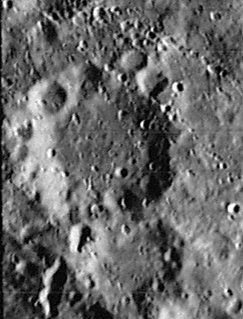Proctor
Contents
Proctor
|
Lat: 46.4°S, Long: 5.1°W, Diam: 52 km, Depth: 1.98 km, Rükl: 65 |
Images
LPOD Photo Gallery Lunar Orbiter Images
Maps
(LAC zone 112D3) LAC map Geologic map
Description
Description: Wikipedia
Additional Information
Depth data from Kurt Fisher database
- Westfall, 2000: 1.98 km
- Cherrington, 1969: 1.31 km
Nomenclature
- Mary Proctor (1862–September 11, 1957) was an American astronomer. She was the daughter of Mary and Richard Proctor. Her father was a British popularizer of astronomy, and she gained her knowledge of the subject from him. She authored many articles for newspapers and journals, and wrote a number of popular books.
- Added to Named Lunar Formations (1935) at request of IAU Commission 17 (Whitaker, p 229).
- This is a miscarriage of justice - her father Richard Proctor was a great popularizer of the Moon and the crater should commemorate him as well. - tychocrater Jul 22, 2007
- Since 1973, the father, whose classic book The Moon: Her Motions, Aspect, Scenery, and Physical Condition is available for free download from Google books, has been commemorated by a 168 km crater on Mars. Several of Mary Proctors books for children are available as well. - Jim Mosher
- List of features named for women.
LPOD Articles
Bibliography
- Proctor, Richard: The Moon: Her Motions, Aspect, Scenery, and Physical Condition, various editions.
- First Edition (1873, contains a much fuller explanation of the lunar theory than later editions)
- Second Edition (1878)
- Third Edition (1886)
- "Third" Edition (1892)
Richard A. Proctor in the Sourcebook Project (William R. Corliss)
In Tornados, Dark Days, Anomalous Precipitation, and related weather phenomena (1983) :
- Rain (English Mechanic, 1868) (decrease of rainfall with increasing altitude)
- Meteors and Meteorology (Royal Astronomical Society; Monthly Notices, 1883) (the effects of meteors on the weather)
In Mysterious Universe, a handbook of astronomical anomalies (1979) :
- Page 533: Comets from the eruptions of Jupiter (Science, 1932) (S.Vsessviatsky's rather curious hypothesis, adapted from Richard A. Proctor's even more bizarre thoughts).
